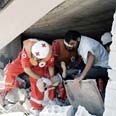
A peculiar decision
There is no pragmatic-democratic state the world over eager to see the victory of a terror organization such as Hizbullah
The prime minister's decision to halt the Israeli air strikes in the south of Lebanon is somewhat peculiar, to say the least. It grinds to a halt the momentum of pounding the Hizbullah and sets off the ceasefire process under the worst possible conditions for Israel.
Hizbullah is continuing to fire rockets into Israel, the organization is standing firmly on its feet, Israel is jittery and folding under the pressure.
Not only should we not halt the campaign, we shouldn't treat the events in the village of Qana as a factor likely to affect it. And no, there is no disrespect for human life or the belittling of the human tragedy.
Israel embarked on this war to achieve targets essential to its existence and it must abide by them, because if it doesn't the price Israel will have to pay throughout the years will become unbearable. If Israel doesn't win this war, it will be impossible to continue living in the Middle East. Certainly not in a Middle East that is likely to have nuclear capabilities within the next few years.
Did anyone ask the Hizbullah or the Lebanese government to halt its fire after eight train station workers were killed in Haifa? If, God forbid, one of the thousands of rockets landing in Israel had hit a populated building bringing about the deaths of dozens of people – would anyone have apologized or folded under the pressure?
Had this happened only the sound of rejoicing would have come from every part of the Arab world – particularly from Beirut. After destroying an entire quarter in Beirut and hundreds of buildings throughout Lebanon – we suddenly got cold feet, we're mumbling and we're being apologetic.
The message
Moreover, Israel must put out a message, without butting an eyelid, that if Huzbullah continues to fire rockets from inside populated areas, and it continues to hide among them – more buildings will be destroyed.
True, after the incident in village of Qana an order was given to the Israeli Air Force to double check its intelligence before marking a building for shelling. However, the principle of bombing buildings in which Hizbullah militants or rocket launchers seek refuge remains in place.
The Israeli Air Force launched its strike on the building at 12.30 p.m. It was apparently a building identified by Israeli intelligence as a command center for launching Katyusha rockets. The IDF had no idea that civilians were hiding in the bomb shelters. The tragedy only became apparent at dawn, when Lebanese rescue workers reached the collapsed building, hours after the bombing had occurred.
Complete the mission
What should really be troubling us on the 19th day of the army's operations in Lebanon, is that the commanding officer of the short range rockets in Nabatiya has managed to fire more than 100 rockets towards Kiryat Shmona in a single day, barrages that lasted for hours on end.
A major part of the rockets were hidden near the Litani River. Here lies the real damage to Israel's deterrence, which it is trying so hard to rehabilitate, an image that is so crucial for the day after the cease fire.
Sunday the IDF concentrated its forces on taking over Hizbullah targets close to the border with Metullah. These operations are due to accelerate during the week. The IDF has to complete the missions of cleaning the south of Lebanon from the Hizbullah strongholds before signing a cease fire agreement.
Military sources say they require a between a week and a half to two weeks to complete this mission. It is doubtful whether they will be given two weeks. However, the army will be satisfied even if it is given 10 days – the question is whether it will be able to take good advantage of the allocated time.
If at the beginning of next week it becomes apparent that army failed to destroy the main part of the Hizbulla's military infrastructure in the south of Lebanon, and that the Katyusha rockets are still being fired toward Israel - it will be difficult to reach a cease fire.
Despite this, it can be said that the incident in Qana cannot be considered a turning point in this war, as it occurred at a time when the political settlement being developed is well known to each of the parties involved.
The enlightened Western world is shocked
Qana will not change these settlements in essence. Meanwhile, the damage to Israel is essentially related to its image. Hizbullah was given a tailwind by the moderate Arab nations who at the beginning of hostilities did not support the organization, on the contrary.
The Arab street is uniting around the Hizbullah. Lebanon's Prime Minister Fuad Siniora is panicking and needs to demonstrate his strength. Political negotiations have been postponed. The enlightened Western world is shocked.
Today the anti-Israeli response is still emotional. Tomorrow the real interests will be brought back to the table. There is no pragmatic-democratic state the world over that is eager to see the victory of a terror organization such as the Hizbullah










